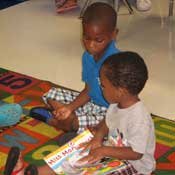The U.S. Department of Education announced last week that nine states will divvy up $500 million in federal funding for early childhood education. Politicians and education advocates can't quite agree on why Mississippi wasn't on the list.
The state applied for an Early Learning Challenge grant in October as part of the Race to the Top program, which rewards states for innovation and reform in public schools. Mississippi applied for Race to the Top funding last year but did not get it. This year, the state was hoping to get $50 million to better coordinate early childhood-education providers around the state.
A panel of five judges reviewed Mississippi's application. They ranked Mississippi 35th of 37 applicants, ahead of Hawaii and Puerto Rico. Annjo Lemons, executive director of the State Early Childhood Advisory Council, said she doesn't know why Mississippi was ranked as poorly as it was. The council led the state's application process for the grant.
"I thought our application was a very valid look at the criteria that they put forth, and they specifically were targeting high-poverty and mostly rural states," she said.
In the past, some have criticized the Race to the Top program for rewarding programs that are better suited to urban areas and might not work as well in largely rural states like Mississippi. This time around, the application information said judges "may consider the need to ensure that systems are developed in states with large, high-poverty, rural communities" in addition to other relevant factors.
When the Department of Education announced Race to the Top grantees last year, The New York Times reported that educators in rural states felt that the competition was tilted to favor more densely populated states. In the article, critics complained that the type of reforms the program was designed to reward--such as charter schools and replacing principals in failing schools--simply do not work in rural areas. Many small towns already struggle to retain staff, critics said, and do not have the population to support a new charter school.
Lemons also pointed to the number of states that received Early Learning Challenge awards that had already gotten Race to the Top grants. Of the nine states that received awards in this round, six had already received Race to the Top awards.
Part of the reason Mississippi didn't get the grant was that Race to the Top generally rewards states with programs already in place. While Mississippi has a hodgepodge of agencies and organizations providing pre-kindergarten programs, it is one of only 10 states without public, statewide early childhood education.
Before the state turned in its application, Rachel Canter, executive director of Mississippi First, said that states that have gotten Race to the Top grants in the past have, for the most part, already had the basic building blocks of strong programs in place and based their grant applications on plans to improve them.
"I think we are at a disadvantage, because we do not have state resources at any discernible level in early childhood education," she said at the time. "... As a state, we haven't shown that strong commitment that other states (have)."
The reviewers gave Mississippi's application an average score of 11.2 points out of 20 for demonstrating past commitment to early learning and development.
Gov. Haley Barbour apparently has a different idea of why the state's application failed. After the U.S. Department of Education announced the grantees, Barbour issued a one-sentence statement to the press, expressing his displeasure. "Of the nine states that got a Race to the Top award, only one has a Republican governor. I wish it had been us," the statement reads.
Despite the disappointment of losing out on $50 million in federal funding, Lemons said many of the people who worked on writing the grant are seeking private funding for some of the most important programs written into the grant application, such as compensation for child-care providers to further their education.
"It has made us even more determined that we're going to find some way to make a difference and move things forward for children," she said. "... I think what we're going to have to do is get grassroots about the whole thing and educate the state about (the need for early childhood education)."
She doesn't see state funding for early childhood education happening any time soon.
"It's hard times right now if you look at the budget and all the planned decreases in all the agencies," she said. "Some (will get) level funding, which is fine and dandy, but it leaves no funding at all as far as anything going on birth to kindergarten."
See reviewers' comments and read more about the Race to the Top program at the U.S. Department of Education's website.



Comments
Use the comment form below to begin a discussion about this content.